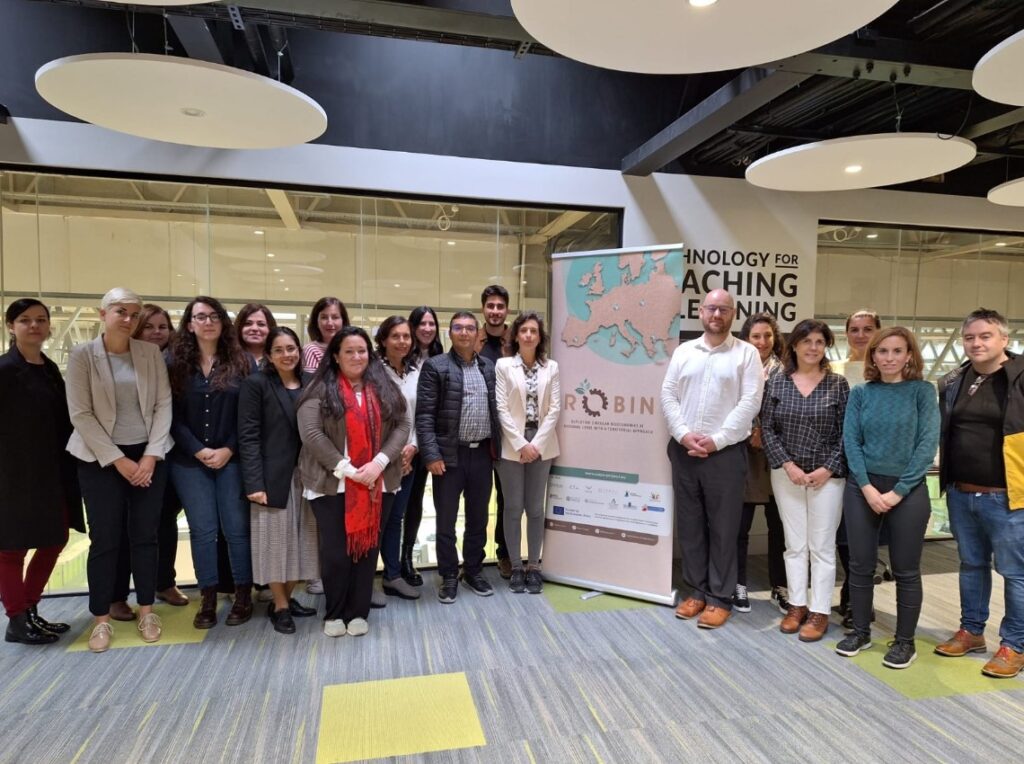
Carmen Ronchel and María García, Biotechnology technical officer and Business Development consultant at CTA (Technological Corporation of Andalusia), respectively, have participated in the third consortium meeting of the European project ROBIN, held in Cork (Ireland). The aim was to work on the creation of action plans that contribute to improving the governance of Circular Bioeconomy in Andalusia and other European regions.
CTA representatives attended the meeting alongside representatives from the other two Andalusian partners in the ROBIN project: the Ministry of Agriculture, Fisheries, Water, and Rural Development (CAPADR) of the Andalusian Regional Government and the Andalusian Institute of Agricultural Research and Training, Fisheries, Food, and Organic Production (IFAPA).
Specifically, they presented the results of co-creation workshops led by CTA, the Ministry of Agriculture, and IFAPA to design models and best practices for Circular Bioeconomy governance.
During the meeting, tools being developed within the project to assist European regional authorities in implementing a robust Circular Bioeconomy governance model were also introduced. Additionally, a workshop was held to shape the action plans for each of the involved regions.
Accelerating the Green Transition
Carmen Ronchel and María García, Biotechnology technical officer and Business Development consultant at CTA (Technological Corporation of Andalusia), respectively, have participated in the third consortium meeting of the European project ROBIN, held in Cork (Ireland). The aim was to work on the creation of action plans that contribute to improving the governance of Circular Bioeconomy in Andalusia and other European regions.
CTA representatives attended the meeting alongside representatives from the other two Andalusian partners in the ROBIN project: the Ministry of Agriculture, Fisheries, Water, and Rural Development (CAPADR) of the Andalusian Regional Government and the Andalusian Institute of Agricultural Research and Training, Fisheries, Food, and Organic Production (IFAPA).
Specifically, they presented the results of co-creation workshops led by CTA, the Ministry of Agriculture, and IFAPA to design models and best practices for Circular Bioeconomy governance.
During the meeting, tools being developed within the project to assist European regional authorities in implementing a robust Circular Bioeconomy governance model were also introduced. Additionally, a workshop was held to shape the action plans for each of the involved regions.
Andalucía, pionera en gobernanza de la Bioeconomía
Andalucía tiene una clara apuesta por la bioeconomía circular, al ser de las primeras regiones europeas en adoptar un modelo de gobernanza de bioeconomía circular, en concreto la Estrategia Andaluza de Bioeconomía Circular (EABC). Asimismo, la recién publicada Ley de Economía Circular de Andalucía (LECA), establecerá los mecanismos necesarios para la implementación de las políticas y regulaciones en materia de economía y bioeconomía circular.
Entre dichos mecanismos se encuentran: impulsar la aplicación de los principios de economía circular en la bioindustria; fomentar la simbiosis industrial entre las actividades generadoras de biorresiduos y aquellas que los valoricen a bioenergía o bioproductos; contribuir al crecimiento y desarrollo sostenible de Andalucía, impulsando actuaciones dirigidas a la producción de recursos y procesos biológicos renovables.
Andalusia, a pioneer region in Governance of the Bioeconomy
Andalusia, a pioneer in Circular Bioeconomy governance
Andalusia has a clear commitment to circular bioeconomy, being one of the first European regions to adopt a circular bioeconomy governance model, specifically the Andalusian Circular Bioeconomy Strategy. Likewise, the recently published Circular Economy Law of Andalusia (LECA) will establish the necessary mechanisms for the implementation of policies and regulations related to circular economy and bioeconomy.
Among these mechanisms are: promoting the application of circular economy principles in the bio-industry; encouraging industrial symbiosis between activities generating bio-waste and those valorizing them into bioenergy or bioproducts; contributing to the sustainable growth and development of Andalusia by promoting actions aimed at the production of renewable biological resources and processes.

